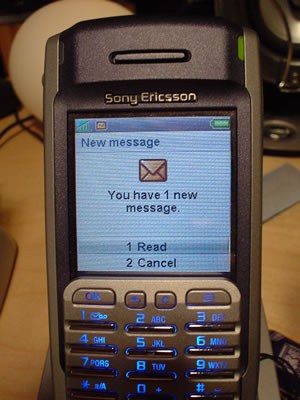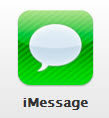 AT&T “streamlined” its text messaging plans over the weekend for new customers, eliminating a less-expensive $10/1000 text budget plan in favor of unlimited texting plans that cost much more.
AT&T “streamlined” its text messaging plans over the weekend for new customers, eliminating a less-expensive $10/1000 text budget plan in favor of unlimited texting plans that cost much more.
That means new AT&T customers who want to text will pay dearly for the privilege:
- $0.20 per text message sent/received,
- $20.00 Unlimited texting (individual line)
- $30.00 Unlimited texting (family plan)
So much for asking customers to ‘pay for what they use.’ AT&T is moving towards unlimited texting — at a very high price — while moving away from unlimited data.
AT&T released a statement about the changes:
“We regularly evaluate our offers and are making some adjustments to our messaging lineup. Starting August 21, we’re streamlining our text messaging plans for new customers and will offer an unlimited plan for individuals for $20 per month and an unlimited plan for families of up to five lines for $30 per month. The vast majority of our messaging customers prefer unlimited plans and with text messaging growth stronger than ever, that number continues to climb among new customers. Existing customers don’t have to change any messaging plan they have today, even when changing handsets.”
Gizmodo points out AT&T is charging customers who don’t have a text plan 100,000 percent more than what they charge for online data:
Here’s how it breaks down:
AT&T charges $25 for 2 gigabytes of mobile data, which states how much they think their bits and bytes are worth. That comes out to 80 megabytes per dollar. 80 megabytes will get you 500,000 text messages—assuming you’re writing the largest possible message, which you’re often not (i.e. “Hey” “Nothing” “lol”).
Now divide that dollar by the 500,000 potential texts. That comes out to $0.000002 per text—two ten thousandths of a cent. A very, very, very small amount of money.
Now, let’s say you send 5,000 texts a month. That’s a large, though wholly realistic number. Multiply that by the above worthless cost per text, and you’ve got—hold onto your wallet!—$0.01. A penny for five thousand texts, according to how much AT&T says its data is worth in a data plan.
But outside of the data plan? Oh boy! Things get very different very fast. And by very different, I mean inordinately overpriced. Those same 5,000 texts, at a rate of $0.20 per message, will cost you $1,000. Not a penny—a grand. Two very different prices for literally the exact same thing.
 For customers who only send and receive occasional text messages, losing the $10 option means most will either pay the heavily marked-up $0.20 a-la-carte price, or pay double and not worry about how many messages they send.
For customers who only send and receive occasional text messages, losing the $10 option means most will either pay the heavily marked-up $0.20 a-la-carte price, or pay double and not worry about how many messages they send.
Ultimately, AT&T’s new prices may drive an increasing number of users to alternative ways of communicating with friends and family, especially as prices keep rising. Some AT&T customers remain grandfathered on text plans that offer 200 messages for $5 a month. But for customers like Ben Chinn of San Francisco, even $5 is asking a lot.
“With everything with the mobile carriers, I feel I’m getting nickeled and dimed,” Chinn told the Los Angeles Times. “I resent paying so much for text messaging, and I feel that it’s not a reasonable price to pay for something that costs the carriers next to nothing.”
Free Press Research Director S. Derek Turner says AT&T’s new prices foreshadow the kinds of higher prices all Americans will pay if the wireless industry continues its march towards consolidation.
“This move is simply another example of AT&T passing off a price increase for consumers as a benefit,” Turner said. “If this were a truly competitive market, AT&T would offer its customers more choice and value, and no carrier would get away with a 10-million-percent markup on its services. This should serve as a warning to the Department of Justice and the Federal Communications Commission — if AT&T is already able to unilaterally increase prices, allowing the company to eliminate low-cost competitor T-Mobile will only make things worse.”
The Times notes Juniper Research has predicted that global revenue for text messaging will peak this year and begin to drift down. And in a recent report, UBS Investment Research warned that “customers could elect not to pay for texting as smartphones and third-party applications become pervasive.”
Facebook has introduced Messenger, a free smartphone app that allows members to exchange text messages with friends, as well as anyone else who happens to have a cell phone. Google Voice includes unlimited free texting, if those sending messages remember your Google Voice number. Apple’s forthcoming iMessage will be pre-installed on most Apple devices, offering a ready-made opportunity to bypass high-priced text plans. There are dozens of other apps that offload text traffic to your smartphone data plan, where the added traffic is so insignificant, it has largely no impact on even the lowest usage plans.
The preferred outcome of using any of these third-party apps is to cancel expensive texting plans from your phone carrier. But there are obstacles:
- Many friends may continue to text your primary cell phone number directly, incurring a-la-carte text messaging fees if you cancel your text plan;
- Many require all of your contacts to run specific apps to exchange messages, which can quickly become a burden;
- Apple’s iMessage assumes all of your friends are using Apple phones or devices. Everyone else will have to hope for, find, and install another app to support the service.
The trade-off works for some, but not for others.
 Hieu Do of St. Louis tells the Times he’s had to pay for individual text messages after dropping his text plan, but Google Voice has still helped him save money:
Hieu Do of St. Louis tells the Times he’s had to pay for individual text messages after dropping his text plan, but Google Voice has still helped him save money:
“At the beginning of every month I would lose a dollar here and there from people texting my old number, but it’s worth it more than paying $5 or $10 a month for a texting plan,” he said.
But Jim Jeffords, one of our readers, tried Google Voice for awhile and decided it was just too cumbersome for texting.
“I ended up getting text messages from a lot of business contacts that didn’t know about my Google Voice number, but had my cell phone number,” Jeffords says. “I was not about to throw a Google Voice number into the mix and come across as cheap and make them remember what number to text.”
Jeffords went back to a basic text plan with a few hundred messages a month included.
“It wasn’t worth the hassle to deal with,” he said.


 Subscribe
Subscribe
First off, if you choose to drop your texting plan, all carriers will allow you to BLOCK text. You have to ask for it, they won’t just tell you that, but it can be done, I’ve asked. Secondly, I’m gonna put this prediction out there; all voice networks will die and voip will take over, then having texting through skype, google, or facebook will be simple since that will be your phone number anyway, but it’ll all go through the data connection. I’m considering that as an alternative to an expensive, cumbersome smartphone plan anyway. In fact, you can get… Read more »
The fact that AT$T’s behaviors so obviously reduce consumer choice in a way to make them more money should be a big warning to the FCC and DOJ to stop the takeover if TMobile NOW. It will only get worse when T-Mobile is gone.
AT$T Rethink how slim you wallet can be
This change is exactly because of the upcoming integration of messaging in iOS, Facebook, Google+/Voice, WhatsApp, and other texting services or apps. AT&T knows their days of gouging customers are limited, their only recourse to maintain that revenue was to offer an all or nothing set of plans that either give too little, or give too much and charge through the nose for both. If they had maintained their 200, 1000, or 1500 text message plans for a reasonable price that would have been plenty for customers to wean themselves off texting and use free alternatives like the iOS messaging… Read more »